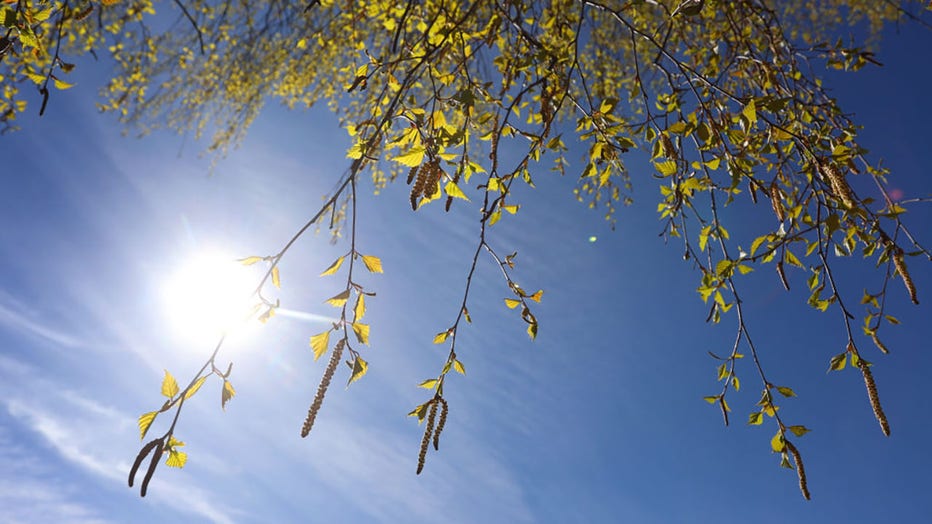Here are the 20 worst US cities for seasonal allergies – and some of the best
Spring allergy preparation—What to know?
Dr. Julia Caucino on preventative measures to take this allergy season.
WASHINGTON - Millions of people across the country each year suffer from pollen-related sneezing, coughing, and watery eyes in the spring. And in some areas, "spring allergies" can start in February and last through early summer.
In fact, about a quarter (25.7%) of all U.S. adults have a seasonal allergy, according to the U.S. Centers for Disease Control and Prevention. Allergies are the sixth-leading cause of chronic illness in the U.S., and are a common asthma trigger leading to increased hospital visits for asthma during peak pollen season, according to the Asthma and Allergy Foundation of America (AAFA).
Some regions may be better suited for allergy-sufferers than others.
A recent report from the AAFA details the most challenging cities in the United States for living with allergies – or what it refers to as "Allergy Capitals."
In 2024, Wichita, Kansas was named the worst city in America for allergies due to its higher-than-average tree and grass pollen, higher-than-average medicine use, and limited access to allergy specialists, the foundation said.
The AAFA’s report called attention to "the urgency of the climate crisis," noting how growing seasons start earlier and last longer than they did just 30 years ago. Some parts of the U.S. now experience pollen – tree, grass, or weed – year-round, it said.
Warmer temperatures also trap heat in urban areas, increase air pollution and stimulate pollen production, the AAFA added.

FILE - Birch pollen hanging from a birch tree under a blue sky and sunshine. (Photo by Karl-Josef Hildenbrand/picture alliance via Getty Images)
"Climate change fuels a perfect storm of conditions that make allergy season worse for people with pollen allergy," AAFA President and CEO Kenneth Mendez said in a statement. "Longer growing seasons mean more exposure to pollen allergy triggers. Additionally, pollen counts tend to rise with warmer temperatures. Now, we see both more days of exposure to pollen and higher daily pollen counts leading to more intense, longer-lasting symptoms."
The 20 worst US cities for seasonal allergies in 2024
1. Wichita, KS
2. Virginia Beach, VA
3. Greenville, SC
4. Dallas, TX
5. Oklahoma City, OK
6. Tulsa, OK
7. Richmond, VA
8. Des Moines, IA
9. Raleigh, NC
10. Fayetteville, AR
11. Allentown, PA
12. Baton Rouge, LA
13. Sarasota, FL
14. Houston, TX
15. Columbia, SC
16. Orlando, FL
17. Little Rock, AR
18. Chattanooga, TN
19. Greensboro, NC
20. Kansas City, MO
The least challenging cities for seasonal allergies
The report ranks the 100 most populous U.S. cities by their tree, grass, and weed pollen scores, over-the-counter allergy medicine use, and the availability of board-certified allergists/immunologists.
Akron, Ohio, was ranked last at 100, meaning it was identified as the least challenging city in 2024 for seasonal allergies.
Overall, the least challenging cities for seasonal allergies were identified as:
91. Bakersfield, CA
92. Tucson, AZ
93. Stockton, CA
94. Sacramento, CA
95. Phoenix, AZ
96. Cleveland, OH
97. San Jose, CA
98. Madison, WI
99. Albuquerque, NM
100. Akron, OH
Which pollens can cause allergies?
Three types of pollen can cause seasonal allergies. Tree pollen pops up in early spring, grasses pollinate, and weeds appear late in the summer and early fall.
The most common tree pollens causing allergies include birch, cedar, cottonwood, maple, elm, oak and walnut, according to the Asthma and Allergy Foundation of America. Grasses causing these symptoms include Bermuda, Johnson, rye and Kentucky bluegrass.
RELATED: Here are the worst spring allergens that will make you cough, sneeze and rub your watery eyes
How to see pollen count in your area
Using a website or allergy forecast app can help allergy sufferers plan their daily activities and manage symptoms.
Websites like Pollen.com or the National Allergy Bureau at AAAAI.org/nab offer more localized pollen count information.
According to Pollen.com, a third of the country is in "medium-high status" for pollen count.
How can I relieve allergy symptoms?
Dr. Nana Mireku, an allergist in the Dallas-Fort Worth area, told the AP last month that people should be aware of what they might be allergic to.
Shah explained to the AP that over-the-counter nasal sprays can help relieve symptoms, but they take a while to kick in, and it's ideal to start using them in early March.
RELATED: Can’t stop using Afrin and other decongestant nasal sprays? You’re not alone
Antihistamines are also an option, but Shah shared with the AP that some patients benefit from changing to a similar brand if one stops working, but noted that there's not much data to support this recommendation.
Young kids and individuals who take different allergy medications, immunotherapies in a version of shots and oral drops can help lower sensitivity in the immune system to allergens, treating symptoms at its core, the AP reported.
This story was reported from Cincinnati. Daniel Miller and the Associated Press contributed.

